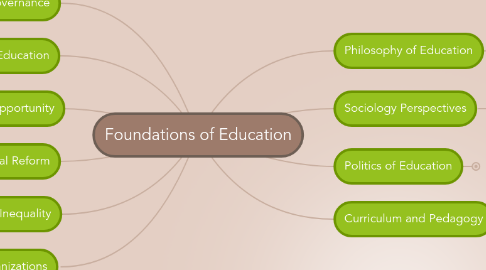
1. Governance
1.1. Senators- Jeff Sessions and Richard Shelby
1.2. House of Representatives
1.3. State Superintendent-Tommy Bice
1.4. State School Board of Representative-Jerry Newman
1.5. Local Superintendent- Jason Adtkins
1.6. Local School Board
2. History of U.S. Education
2.1. Deluder Laws
2.1.1. 1642
2.1.2. Learn Read & the Bible
2.2. Meritocracy
2.2.1. Education for everyone
2.2.2. Went to college on your merit
2.2.3. Thomas Jefferson
2.3. Public Schools
2.3.1. BOYS only
2.3.2. Girls learn to read then sent home
2.4. Utilitarian
2.4.1. Technical: welding, electrician
2.5. Civic Motive
2.6. Social-Engineering Reform
3. Equality of Opportunity
3.1. Response to Coleman Study
3.1.1. 1966
3.1.2. Coleman found that school organizational differences did not contribute to student outcomes
3.1.3. schools do make a difference
3.1.4. lower class students should attend schools with the middle and upper class to improve their educational success
3.2. Class, Race, Religion
3.3. School Segregation
3.3.1. Evidence shows that highly segregated schools have lower achievement levels than integrated schools and minorities do better in integrated schools
4. Educational Reform
4.1. Theory of Educational Problems
4.1.1. Integrative Realm
4.1.1.1. basic skills and knowledge is the focus for school improvement and student achievement
4.1.2. Developmental Realm
4.1.2.1. focus is on developing the whole child by having schools become more humane institutions
4.2. Reform in Education
4.2.1. two waves of attacks
4.2.1.1. The first was concerned with accountability and achievment
4.2.1.2. The second was concerned with the process of the school
5. Education Inequality
5.1. Functionalist Theorists
5.1.1. support the idea that each students’ success is determined by their own hard work and desire to succeed
5.2. Conflict Theorists
5.2.1. support the idea that student success is affected by their environment.
5.3. Interactionist Theorists
5.3.1. support that student success is determined by a combination of factors such as family, social class schools and environment.
6. Schools as Organizations
6.1. Great Britain
6.1.1. 1944 created free elementary and secondary education for all
6.1.2. Margret Thatcher tried to privatize public education
6.1.3. Education Reform Act of 1988 created more centralized curriculum
6.2. Japan
6.2.1. centralized its system in the 1880's
6.2.2. Education is highly competitive
6.2.3. very demanding and rigorous college exams
6.3. Former Soviet Union
6.3.1. Communist Party children had benefits
6.3.2. Centralized system- no one would be left in need
6.3.3. Downfall of the Soviet Union was a result of the inequality that was created
6.4. France
6.4.1. Only the very elite have opportunity to move up educationally
6.4.2. schools for the poor and schools for the elite
6.5. Finland
6.5.1. Highest scores on math, science and literacy exams
6.5.2. Emphasis is on formative evaluations
6.5.3. Competitive salaries for teachers
6.6. Germany
6.6.1. Students are sorted at an early age
6.6.2. System is highly stratified and competitive
7. Philosophy of Education
7.1. Goal of Education
7.2. Generic Notations
7.3. Key Researchers
7.3.1. Included
7.3.2. Included
7.3.3. Excluded
7.4. Role of the Teacher
7.5. Method of Instruction
7.6. Curriculum
8. Sociology Perspectives
8.1. Relationship between school and society
8.2. Three Effects of Schooling Individuals
9. Politics of Education
9.1. Liberal
9.1.1. Dependencies
9.1.2. Milestones
9.2. Education
9.2.1. Schedule
9.2.2. Budget
9.3. Schooling
9.3.1. KPI's
9.4. Progressivism Vision of Education
9.5. Conservative
9.6. Vision
9.6.1. Traditional, Progressivism
9.7. Perspective
9.7.1. Conservative, Liberal, Neo-Liberal
10. Curriculum and Pedagogy
10.1. Historical Curriculum Theory
10.2. Sociological Curriculum Theory
10.3. Formal
10.3.1. What we teach: Math, Science, Band, Art
10.4. Informal or Hidden Curriculum
10.4.1. Moral and Ethically "Right thing to do"
10.5. Null Curriculum
10.5.1. taught but not obvious
10.6. Stratification of the Curriculum
10.6.1. students are tracked and directed
